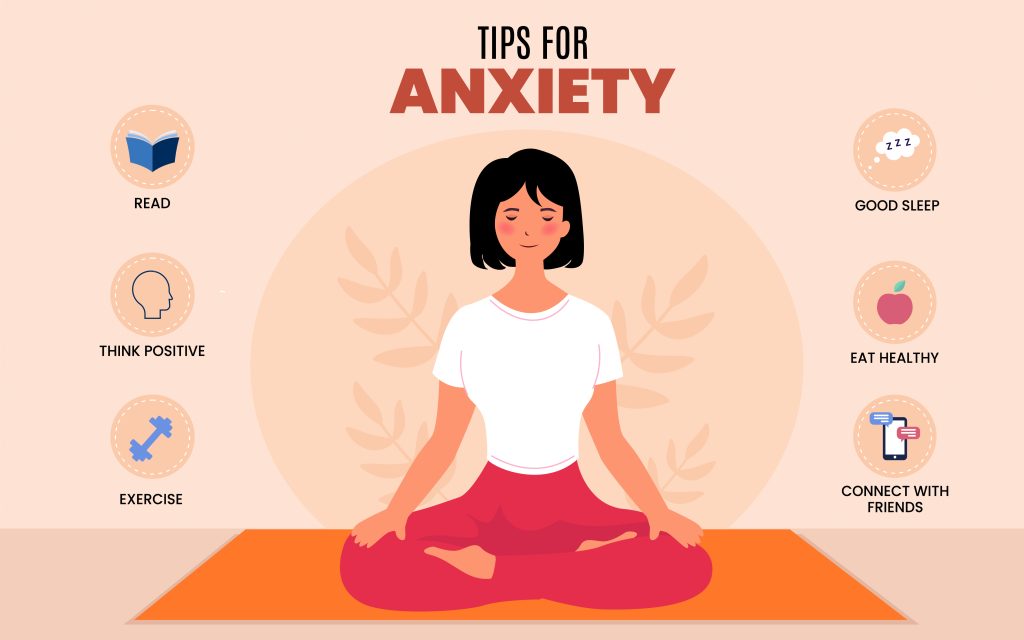
Disclaimer: This publication is for informational purposes only and is not intended as medical advice. Medical advice should always be obtained from a qualified medical professional for any health conditions or symptoms associated with them. Every possible effort has been made in preparing and researching this material. We make no warranties with respect to the accuracy, applicability of its contents or any omissions.
What Is Emotional Stress?
The American Psychological Association (APA) defines emotional stress as “an unpleasant emotional state characterized by a pattern of psychological, physiological, and behavioral responses to a real or imagined stimulus that is perceived as threatening or challenging.”
While there are many types of stress, emotional stress is a specific type that is characterized by the perception of a threat or challenge to one’s emotional well-being. Unlike physical stress, which is caused by a direct physical threat or demand, emotional stress arises from a psychological or emotional stimulus.
Because emotional stress can emerge for a variety of reasons and in a variety of ways, understanding how it functions and how it can affect you is essential. All people will experience stress at different points in their lives; emotional stress is a common type that all people will encounter at some time. Understanding what it is and how it functions is an essential part of learning how to handle it properly and healthily.

10 Benefits Of Managing Stress That Affects Emotional Health
Learning how to manage emotional stress can be tough, but the payout is absolutely worthwhile, both in the short and long term. Consider these ten major benefits of learning how to manage stress that affects your emotional health, as outlined by the United States Department of Health and Human Services:
1. You will experience improved physical health.
Managing emotional stress can help reduce the risk of stress-related physical health problems such as heart disease, high blood pressure, and digestive issues. By managing emotional stress, individuals can help reduce their risk of these stress-related health problems.
Effective stress management techniques, such as exercise, mindfulness meditation, and cognitive-behavioral therapy, can help reduce the body’s stress response, lowering the levels of stress hormones and promoting relaxation.
This can lead to lower blood pressure, improved heart health, and better digestion. In addition, by reducing emotional stress, individuals may be more likely to engage in other health-promoting behaviors such as regular exercise, healthy eating, and getting enough sleep, which can further contribute to improved physical health.
2. You will experience improved mental health
By managing emotional stress, individuals can help reduce their risk of developing mental health problems. Effective stress management techniques, such as regular exercise, mindfulness meditation, and talking to a mental health professional can help individuals cope with stress and build resilience.
For example, regular exercise can boost mood and reduce symptoms of anxiety and depression. Mindfulness meditation can help individuals become more aware of their thoughts and feelings and develop a more positive and accepting attitude towards them, which can help reduce stress and improve mental well-being.
In addition to reducing the risk of mental health problems, effective stress management can also help individuals who are already struggling with anxiety or depression. By learning effective coping strategies, individuals can better manage their symptoms and improve their overall quality of life.
3. Your sleeping habits will improve.

Managing emotional stress can help improve sleep quality, making it easier to fall asleep and stay asleep. Experiencing unmanaged stress can wreak havoc on sleeping patterns and habits. Stress can cause you to sleep too much, sleep too little, and struggle to stay asleep all night. Once you can manage your stress levels, you’ll notice yourself returning to better, healthier sleeping patterns.
4. You will experience increased energy levels.
Chronic emotional stress can take a toll on both physical and mental energy levels. When individuals are dealing with stress, they may feel exhausted and fatigued, both mentally and physically. This can make it difficult to focus, complete tasks, and engage in activities that they enjoy.
By managing your emotional stress, you can help increase your energy levels and reduce feelings of fatigue. Effective stress management techniques, such as exercise, good nutrition, and adequate sleep can all contribute to increased energy levels.
Regular exercise, for example, has been shown to boost energy levels and reduce feelings of fatigue. Eating a healthy diet that includes plenty of fruits, vegetables, and whole grains can also help provide the body with the nutrients it needs to function optimally, reducing feelings of fatigue and promoting overall wellbeing. Additionally, getting adequate sleep is essential for replenishing energy levels and restoring the body and mind.
5. You can improve your personal relationships with others.
Effective stress management can help improve communication and reduce conflict in relationships, leading to stronger and more fulfilling connections with others. Chronic emotional stress can take a toll on personal relationships, causing communication breakdowns and increasing the risk of conflict.
By managing your emotional stress, you can use effective communication skills and coping strategies more easily. These skills and strategies can help reduce tension and promote better relationships. For example, mindfulness meditation can help individuals become more aware of their thoughts and feelings, making it easier to communicate clearly and calmly. Cognitive-behavioral therapy can also help individuals identify and challenge negative thinking patterns that can contribute to conflict and emotional stress.
6. You might notice increased productivity levels.
Managing emotional stress can improve cognitive function and concentration, making it easier to focus and be productive in your daily life. Chronic emotional stress can impair cognitive function, making it difficult to concentrate, remember things, and make sound decisions.
By managing your emotional stress, you can reduce the impact of stress on the brain and improve your overall cognitive function. Regular exercise, for example, has been shown to improve cognitive function and concentration, as has mindfulness meditation. By taking action to reduce emotional stress, individuals can also reduce the distractions and negative thinking patterns that can interfere with productivity.

7. Your decision-making skills can improve..
Effective stress management can improve decision-making skills by reducing cognitive distortions and emotional reactivity. Chronic emotional stress can impair decision-making skills, leading to impulsivity, indecision, and poor judgment.
By managing your emotional stress, you can improve your ability to make decisions by developing more effective coping strategies. For example, mindfulness meditation can help individuals become more aware of their thoughts and feelings, reducing emotional reactivity and promoting more thoughtful decision-making.
8. You will notice a higher sense of self-esteem.
Reducing emotional stress can improve self-esteem and confidence, which can help you feel more capable and resilient. Chronic emotional stress can take a toll on self-esteem, contributing to feelings of worthlessness, inadequacy, and low self-confidence. By managing emotional stress, you can learn effective coping strategies and build resilience, improving your overall sense of self-esteem and confidence.
9. Your overall happiness levels will increase.
Effective stress management can lead to increased feelings of happiness and well-being, as individuals feel more in control of their lives and able to enjoy activities and relationships.
Chronic emotional stress can contribute to feelings of sadness, hopelessness, and poor mood. By managing your emotional stress, you can reduce negative emotions and promote more positive feelings of happiness and well-being

10. You can enjoy the likelihood of living a longer life.
Managing your emotional stress can help reduce the risk of stress-related health problems, potentially increasing your longevity and overall quality of life. Chronic emotional stress can contribute to a variety of health problems, including heart disease, high blood pressure, and diabetes, all of which can impact your likelihood of living a long, healthy life.
By managing emotional stress properly, you can reduce the physical impact of stress on the body and promote overall health and well-being. Regular exercise, healthy eating, and stress-reduction techniques like mindfulness meditation can all contribute to reducing stress and improving overall health, potentially increasing longevity and quality of life.
15 Ways To Identify Sources Of Emotional Stress Within Your Life
Pinpointing exactly what is causing excessive emotional stress in your life isn’t always easy to do. If you are struggling to determine exactly what is causing your emotional stress levels to soar, you can do some investigating to get to the roots of the issue.
Here are fifteen methods that can help you to identify sources of emotional stress in your own life:
1. Keep a journal as a self-reflection tool.
Spend some time each day reflecting on your thoughts and feelings and note any sources of stress that come up in a journal. Forcing yourself to focus and think back through your day can help you create a record of potential patterns between your different days; within these patterns, you may be able to identify specific patterns that point to emotional stressors.
2. Identify your unique stress triggers.
Pay attention to situations or people that consistently cause you to feel stressed or overwhelmed. All people have their own unique sets of triggers, or stimuli that evoke uncomfortable, unpleasant responses within them. Take note whenever you notice stress beginning to creep into your life – you may be able to identify your specific emotional stress triggers and squash them before they become bigger issues.

3. Evaluate your personal relationships.
Assess the quality of your relationships with family, friends, coworkers, and other important people in your life. Sometimes, these relationships can be more toxic than positive; when this happens, the relationships may serve as a source of emotional stress within your life that is causing you more harm than good.
4. Assess your current work-life balance.
Evaluate how much time you are spending on work, leisure, and other activities, and assess whether your schedule is balanced. Sometimes, people discover that they spend far too much time at work, which creates an unhappy balance in their personal lives. Rather than spending time with friends and family or engaging in enjoyable hobbies, people discover that they’re spending too much time at work, leading to dissatisfaction and other emotional stress.
5. Consider any major life changes you have recently experienced or will soon experience.
Reflect on recent or upcoming major life changes, such as a move, a new job, or a relationship change. Any time you go through a major life change (and even when you are anticipating one coming up soon), you might notice emotional stress forming around all aspects of the change, including leaving behind the familiar to embrace something new.
6. Identify physical stressors within your environment..
Some people are highly sensitive to even the smallest irritants within their physical space. Identify any physical stressors in your environment, such as noise, light, or temperature. Over time, these pesky little stressors can cause you to feel emotionally strained as you try to work with them, around them, or through them.
7. Assess your current financial situation.
Evaluate your financial situation and assess whether it is causing stress or anxiety. Your finances have the power to affect almost every other area of your life, so when your financial situation is disordered, you may feel a lot of emotional stress because of it. For example, struggling with your finances can affect your romantic life, particularly if you and your partner share financial responsibilities.

8. Consider health factors that might be causing stress.
Assess whether any health issues, such as chronic pain or illness, are causing stress in your life. Even temporary ailments and illnesses can invite excess stress into your life. Not feeling well can cause you stress to challenge your emotions; developing undue emotional stress while working through an illness or injury isn’t uncommon at all.
9. Evaluate the expectations you have for yourself and others.
Consider whether you are putting too much pressure on yourself or have unrealistic expectations for yourself or others. Everyone wants to live a perfect life, but in reality, perfection does not exist. Be realistic about the expectations you put on yourself and others – if they are too out of reach or even downright unattainable, they are likely inviting lots of excessive, unnecessary emotional stress into your life.
10. Assess all of your daily routines.
Evaluate your daily routines and assess whether they are contributing to stress or making it more difficult to manage stress. Sometimes people will continue with old routines because they are familiar – even if they are no longer serving them positively. Changes in routines are often necessary over time; don’t hang on to old routines simply because they are familiar. Doing so can create tons of unnecessary stress within your life.
11. Reflect on your past experiences.
Reflect on past experiences that may be contributing to stress, such as trauma or past relationship problems. Letting go of past mistakes, failures, trauma, problems, and more can be challenging. However, learning how to let these experiences go is a key component of moving forward in a way that does not allow them to control your emotions or bring excess stress into your life.
12. Consider how frequently you are using social media.
Assess whether too much social media use is causing stress or anxiety. Constantly scrolling through your friends’ “highlight reels” of good-times-only moments can be stress-inducing because it encourages you to compare your own situations to the ones they are curating online. Social media also makes it easier to consume news, media, and more on a constantly updating basis, which can be a major stressor.

13. Evaluate your self-care habits and routines.
Assess whether you are taking care of yourself physically, emotionally, and mentally, and whether you need to make changes to improve self-care. Self-care time should be a cemented part of your everyday routine. Taking good care of yourself is essential for preventing extra stress from forming within your life; make sure you are making time for this regular chance to relax and refresh.
14. Consider your personal values and goals.
Reflect on your values and goals and assess whether you are living in alignment with them. If you ever notice that you are living life and making choices in a way that does not align with your personal values and goals, you may notice some feelings of stress and unease. Sometimes, people begin living in a way that derails these values and goals entirely; doing so can create tons of stress and unhappiness.
15. Seek feedback from people you trust.
Ask trusted friends or family members for feedback on areas of your life that may be causing stress and consider their perspectives. Asking for an outsider’s opinion on your personal situations can help you see what is happening from a different angle. Seeking feedback from someone you trust can help open your eyes to different possibilities and tame stress from taking over your emotions.
To maintain overall well-being, it’s essential to develop effective coping strategies and self-care habits, and seek support when needed.
Here is a Bonus Graphic For You: “Tips For Anxiety”
This graphic contains tips for living a positive lifestyle and minimizing anxiety in your life.
You can download this graphic by using “Right-Click..Save Image As” or there is a “Download” button below this graphic.
Please leave a comment and let us know if you find it helpful. 😊

Next week we will conclude with Part 3 of our Emotional Stress series by looking at Ways To Manage Stress So It Doesn’t Damage Your Emotional Health.
References
McEwen, B. S. (2017). Neurobiological and systemic effects of chronic stress. Chronic stress (Thousand Oaks, Calif.), 1, 2470547017692328.
https://doi.org/10.1177/2470547017692328



